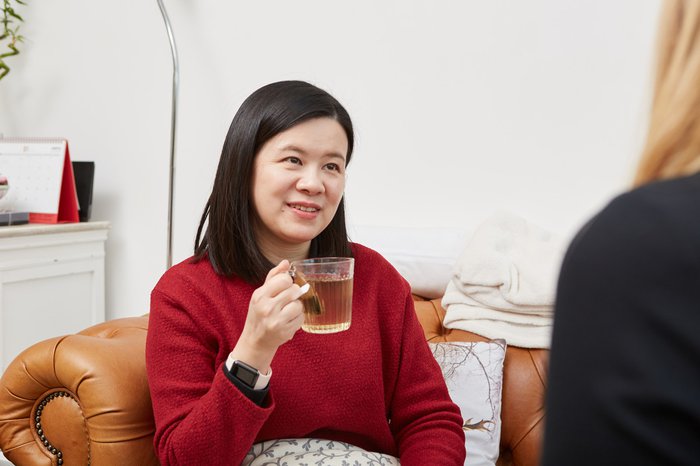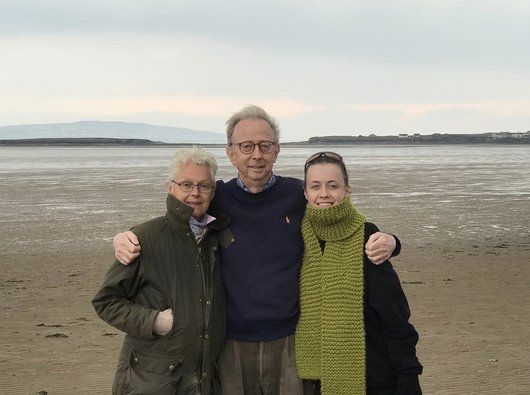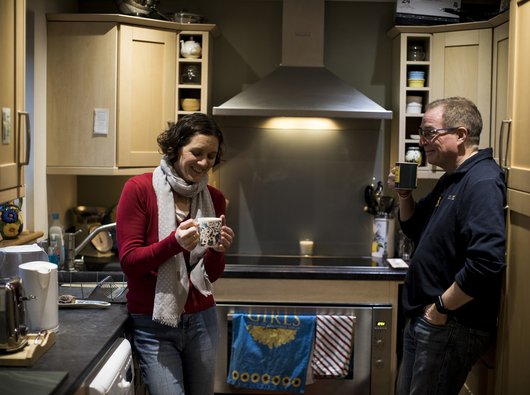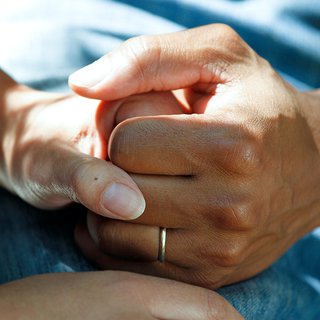How to support your friend or relative through blood cancer treatment
Your friend or relative is having treatment for blood cancer and you want to help, but you're not sure how. Read on for ways you can support them at a difficult time.

It could be leukaemia, lymphoma or myeloma. It could be MDS or MPN.
Whichever type of blood cancer your friend or family member has been diagnosed with, they are likely to be in shock, and as treatment starts, they may be faced with practical difficulties too.
It’s certainly a time when they might need a bit of help.
On this page:
Blood cancer treatment and what to expect
Remember the people around the patient
If you or someone you know is struggling
If you are a carer for someone with blood cancer, read our carer's guide to supporting a loved one through blood cancer treatment.
Blood cancer treatment and what to expect
Some types of blood cancer are slow growing, and don’t always need treatment. But most people will need treatment at some point, and some need it straight away.
Unlike other types of cancer, blood cancer can’t be removed by surgery. The treatment might be chemotherapy, targeted drugs or a combination of the two. Treatment can cause side effects which vary from person to person.
Your family member or friend may be lucky and have few side effects. Or they may find it hard going and have a range of different effects, such as feeling exhausted, feeling sick, mouth sores or gut problems, and even difficulty walking. Treatment can also change how people look, which can be distressing. For example, chemotherapy can cause hair loss, and many people put on weight with steroids.
It’s important to know that treatment takes an emotional toll as well as physical one. People may feel scared, numb, vulnerable or unprepared, and they may to seek counselling or other psychological support.
Some people stay in hospital for treatment, but many will have it as an outpatient, going home between appointments. Even for outpatients, having treatment can mean spending hours at the hospital as the drugs often have to be delivered slowly. Treatment can take weeks, months, even years, although there are usually breaks in the treatment schedule.
Some people with slower growing blood cancer may be treated with daily tablets. These can be taken at home but may still cause side effects.
We have information about blood cancer treatment and common side effects of treatment if you’d like to know more. We also have information for people who’ve just been diagnosed which will help you understand more about your friend or relative's situation.
"Looking back, I wish I’d known more about what the treatment would be like so I could have understood more about what was going to happen.”
Read Jasmine’s story: Celebrating the little wins

How can I help?
Most people want to help when they find out someone they know and love has been diagnosed with cancer, but they may not know how to go about it.
Offer practical help
It’s fine to say to someone, “Let me know if you need anything.” But people with blood cancer and their families say it’s better to offer specific help. Here’s why.
Sometimes people don’t have the head space to think about what help they need in the moment. They’re dealing with a lot. Also, people tend to be embarrassed about putting someone else to any trouble. They’ll say yes to a general offer but never follow up.
So think about what they might need. Here are some suggestions for things you could offer:
- do the school run
- offer a few hours of childcare
- give them a lift to the hospital
- take them shopping, or do it for them
- take round a cooked meal
- do some washing or ironing
- look after their pets if they’re in hospital
- walk the dog
Think about what you can do without causing yourself too much stress and hardship – no one expects that – but there may be something you could fit into your routine that will make all the difference to a family affected by blood cancer.
You might need to press your point when it comes to offering help. It might even be better not to ask, just do. For example, if you’re cooking a meal, make extra and drop it round – if it’s not needed, it can go in the freezer for another day.
Read Sue’s story: Because family life doesn’t stop for treatment for more insights into how blood cancer treatment affects the whole family.
Stay in touch
You may not be able to offer practical help, perhaps because you don’t live close enough or because of other circumstances in your life. But it’s still important to stay in touch as people want to remember there’s a world outside of blood cancer. So don’t be afraid to talk about everyday things.
Here are some things to consider:
- Message, text or email rather than calling, unless it’s requested. A call might interrupt much-needed rest or treatment.
- If you do arrange a call, don’t assume it’ll be a video call – ask what they would prefer as they may feel uncomfortable about their appearance during treatment.
- Carers can also find phone calls exhausting and time-consuming, but if you message or email, they can respond when they have time and energy.
“It’s great to get messages...but I was often too tired to reply. So do keep sending supportive messages, but it helps if you don’t expect a response.”
Read Bansri’s story: How to be a good friend to someone with blood cancer

Support a charity
Many people are motivated to support charities that help people with blood cancer by providing services and funding life-saving research.
If you would like to support Blood Cancer UK to show you are thinking of your family member or friend, there are several ways to do this:
- Make a donation – it’s quick and easy but absolutely vital for developing new treatments for blood cancer.
- Plan a fundraising activity – we have lots of ideas to suit different interests and abilities. You don’t have to run a marathon!
- Join a local fundraising group, or even start your own.
- Support someone else in your circle who’s raising funds for us.
- Send a card or gift from our online shop to support your loved one and help fund blood cancer research.
As Bansri says, “Fundraising is also a good way for people to get together during a tough time. My family found it was a really positive thing to do.”
Donate blood or stem cells
Becoming a blood or stem cell donor is another way of supporting your loved one by supporting the blood cancer community as a whole.
People with blood cancer sometimes need blood transfusions as part of their treatment - about a fifth of all red blood cell units donated go to people with blood cancer. So if you are able to donate blood, this may be a positive step to take.
A stem cell transplant treats blood cancer by replacing damaged blood cells with healthy ones. Sometimes these healthy cells need to come from a donor whose tissue type matches the person who needs the transplant.
The more people volunteer to donate stem cells, the better the chances of someone who needs a transplant finding a suitable match.
Blood and stem cell donors have to meet certain conditions relating to their age and health. Find out more about blood donation at NHS Give Blood. To read more about becoming a stem cell donor, go to Anthony Nolan or DKMS.
Remember the people around the patient
When someone is ill, a lot of attention is quite rightly directed towards them. But the person standing by their side, holding everything together, can get forgotten.
That person could be juggling a lot of things: their loved one’s needs, work, caring for children or elderly relatives, managing their own health issues. They may look OK, but they could be soldiering on at the expense of their own health.
Partners and others in caring roles say they put themselves last. Their priority is the person who is sick, and anyone else they have to look after. Particularly during treatment periods, it can be difficult for them to look after their own well-being.
So just remember to ask, “And how are you?” And then listen. You don’t have to offer any advice or even try to be positive. Just acknowledge their feelings. It might not sound like much, but it will make a difference.
“At the hospital no one asked me if I was OK, if I needed support. It can be quite hard to find emotional support for yourself.”
Read Janet’s story: Treatment that never stops

When treatment ends
When someone finishes treatment, it’s tempting to think that everything can go back to normal. But for the person with blood cancer, it’s often not that simple.
There may be lingering side effects. Some treatment side effects can carry on for a long time after treatment has stopped, and sometimes there may be permanent changes to someone’s body.
For some types of blood cancer, remission (where there are no or very few cancer cells left), may be a temporary situation, with treatment almost certainly needed again at some point in the future.
Covid is another problem that doesn’t go away when treatment finishes. Covid vaccines don’t work as well for people with blood cancer so even when someone is in remission, they’re still at high risk from serious illness if they catch covid.
We have more information about coping with risk and uncertainty around covid and blood cancer.
Lasting effects
The end of treatment is also a time when people start to process what’s happened to them. This can be difficult psychologically. Medical appointments become less frequent after treatment, so there’s less contact with the hospital team. People say they can feel particularly alone and insecure.
There can be long-term physical effects too. People may still be extremely tired, weak and vulnerable to infections.
So don’t assume everything will go back to normal when treatment is over. Your friend or family member will be getting used to a new normal, and they’ll still appreciate any support you can offer.
Jasmine says, “I was quite naïve at first, expecting that once Dad was in remission it would feel like normal life for him again. However, this has certainly not always been the case. He was out of action for numerous months with infections and various other little complications along the way.”
The reality of remission
Remission from blood cancer is an achievement, but it doesn't always feel like the end of the story. Kayleigh and Gail discuss their feelings about their partners finishing treatment.
If you or someone you know is struggling
Our Support Service is here for anyone affected by blood cancer. You can contact 0808 2080 888 (calls are free) or [email protected]. Get in touch if you have any questions or want to talk something through. Or pass these details on to someone else who may be having a tough time.
We also have an online community forum where people can share their experiences. It’s open to anyone affected by blood cancer and you don’t have to join up to see what people are talking about.
To find out more about what it’s like to have blood cancer or support someone through it, browse our stories. If you're a carer for someone with blood cancer, read our carers' guide to supporting a loved one through blood cancer treatment.
To support life-saving research, make a donation today:

